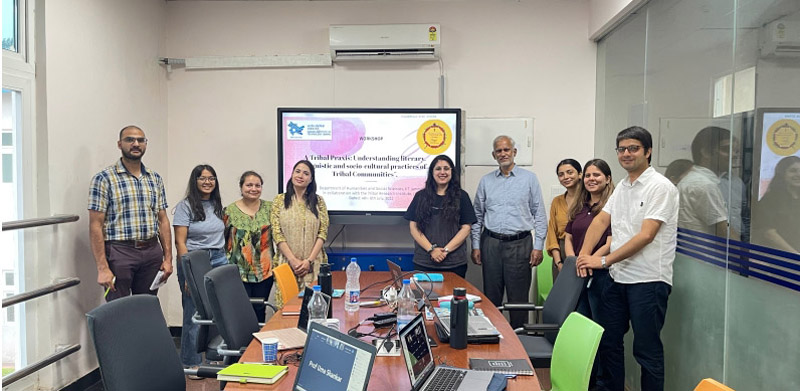Excelsior Correspondent
JAMMU, July 6: The Department of Humanities and Social Sciences (HSS), IIT Jammu, in collaboration with the Tribal Research Institute (TRI), J&K, organized a three-day workshop on “Tribal Praxis: Understanding Literary, Linguistic and Socio-cultural practices of the tribal communities of J&K”.
The main objective of the workshop was to provide a platform for assimilation of ideas, theory and practice while developing a roadmap for fruitful collaboration between IIT Jammu and TRI, J&K.
Professor Manoj Singh Gaur, Director IIT Jammu, talked about the vision of IIT Jammu in trend-setting research and the significance of the MoU with the Tribal Research Institute in taking it a step further. He further emphasized that IIT Jammu’s mission has been to meet the diverse demands of various sectors from entrepreneurship, cultural diversity, artisanship, arts and craft of J&K, including notably the young brigade of students from various locales of the region and to fulfill the responsibility to develop strategies to strengthen the regional diversity of J&K.
Dr Amitash Ojha, Head of the Department (HSS, IIT Jammu), highlighted the importance of the collaboration between IIT Jammu, and TRI, J&K and the establishment of a Tribal Chair with the goals of comprehensively gathering tribal data, transcreating, digitizing, disseminating, and studying the tribal culture from a research-oriented perspective through workshops, conferences, field trips, seminars, cultural programmes, and exhibitions.
Dr Quleen Kaur Bijral, Assistant Professor & FIC, Oral Narrative Center (Zuban-e-Kalam) HSS, IIT Jammu, elucidated the theme of the workshop as how to achieve its targets, and provide tangible and satisfactory outcomes. She highlighted that before the initiation of any project, planning should be of primary focus.
Dr Javaid Rahi, Chief Editor, J&K Academy of Art and Culture, painted a vibrant picture of the culture and essence of the indigenous tribes of Jammu and Kashmir through his words. He shared his rich experience of working with the two prominent tribal communities of Gujjars and Bakerwals of J&K and the uniqueness of their socio-economic structure.
Dr Abdul Khabir, Deputy Director, Tribal Affairs Department and Nodal Officer of the Tribal Research Institute eloquently summarized the very heart of this collaboration.


